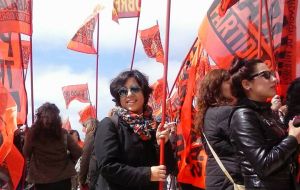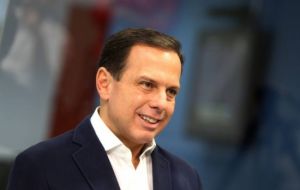MercoPress. South Atlantic News Agency
Lula's Workers Party support shrinks 60% in Sunday's municipal elections
 The Workers Party vote shrank nationally from 17.3 million votes in 2012’s local elections to just 6.8 million on Sunday, a drop of 60%.
The Workers Party vote shrank nationally from 17.3 million votes in 2012’s local elections to just 6.8 million on Sunday, a drop of 60%.  Lula da Silva had sought to turn the election into a referendum on his party’s claim that Rousseff’s impeachment amounted to a coup
Lula da Silva had sought to turn the election into a referendum on his party’s claim that Rousseff’s impeachment amounted to a coup  In São Paulo, the biggest city in South America, the conservative businessman João Doria became the city’s first mayor to be elected on the first round
In São Paulo, the biggest city in South America, the conservative businessman João Doria became the city’s first mayor to be elected on the first round Brazil’s Workers Party suffered its worst-ever result at the polls as voters used Sunday’s local elections to punish it for a deep recession and a series of corruption scandals. After 13 years in power the party saw its vote collapse across Brazil in a dramatic confirmation that it is now fighting to retain a seat at the top table of Brazilian politics following the impeachment of president Dilma Rousseff in August and the decision last month to try party founder and former president Lula da Silva for corruption.
With most results declared, the Workers Party has seen the number of municipalities it controls plunge from the 644 peak it achieved in 2012 to just 256 now, though it may pick up another handful once remote regions declare and run-off rounds are held in big cities in three weeks’ time. It means the party is now the 10th-largest in terms of town halls under its control.
Nationally its vote shrank from 17.3 million votes in 2012’s local elections to just 6.8 million on Sunday, a drop of 60%. It is the first time since its foundation in 1980 that the party comes out of local elections with fewer elected officials than it had achieved four years previously.
Lula da Silva had sought to turn Sunday’s elections into a referendum on his party’s claim that Rousseff’s impeachment amounted to a coup and so strengthen its demand new general elections. But the party hemorrhaged support even among its traditional voters.
In São Paulo, the party’s birthplace and the biggest city in South America, the conservative businessman João Doria became the city’s first mayor to be elected on the first round even winning poorer districts and slums that traditionally voted Workers Party.
The party’s grip on the so-called red-belt of industrial satellite cities surrounding São Paulo was also broken and it was left in a humiliating third place in São Bernardo do Campo, Lula’s home city and where he first rose to prominence as an independent union leader in the 1970s.
Brazil’s 26 state capitals the Workers Party now only controls one, the small jungle city of Rio Branco, and has a slim chance of clinching a second in a run-off round in the north-eastern city of Recife.
Sunday’s big winner was the party’s traditional rival, the Social Democracy Party of Brazil, PSDB, which, as well as its banner victory in São Paulo, saw its vote and the number of municipalities it controls increase across Brazil, leaving it well placed to dispute 2018’s presidential election.
The Democratic Movement of Brazil Party of new president Michel Temer also performed well despite the Workers’ Party’s efforts to portray his government as illegitimate. It slightly increased the number of municipalities it controls, even though its vote dipped compared to four years ago.
But widespread dissatisfaction with Brazil’s democracy was laid bare with electoral authorities saying that despite voting being obligatory, the total of abstentions, spoiled and blank ballots topped the first-placed candidate in 10 state capitals including the three most important of São Paulo, Rio de Janeiro and Belo Horizonte.




Top Comments
Disclaimer & comment rules-

-

-

Read all commentsThe remaining 40% are mass-hypnotized, brainwashed &/or ignorant of the reality.
Oct 04th, 2016 - 11:24 am 0Just like the Brasshole and a handful of other non-Brazilian posters who pretend to know all about Brazil...I won't mention any names in order to avoid giving them the right to respond...but if they do, it's because the hat fits.
Oct 04th, 2016 - 04:21 pm 0Yes how the worm has turned for Brasshole. Thank goodness his kind are gone from running a country with great potential into the ground.
Oct 04th, 2016 - 04:25 pm 0Commenting for this story is now closed.
If you have a Facebook account, become a fan and comment on our Facebook Page!